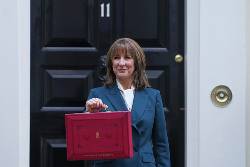LONDON (AP) — Britain's Treasury chief Rachel Reeves stood up Wednesday to deliver a crucial tax-raising budget statement to lawmakers following an unprecedented leak from the government's independent forecaster that basically laid out her measures.
The biggest change in terms of money raised, according to the leak from the Office for Budget Responsibility, is freezing the levels at which earners pay Britain’s different tax levels, meaning as wages rise, more people fall into higher tax brackets.
Other measures include a mansion tax on high-valued properties, changes to the capital tax regime and a cut to tax-free provisions for private pensions.
According to the leaked documents from the OBR, which it has apologized for, the government will raise 26 billion pounds ($34 billion) in 2029-30.
The OBR blamed a “technical error” for the leak, saying it went “live on our website too early this morning.” It said it will report to all relevant authorities, including the Treasury, as to what happened.
The leak is a further embarrassment for the United Kingdom's center-left Labour government following weeks of weeks of speculation and mixed signals that unsettled the markets,
The budget, Reeves' second since Labour returned to power after 14 years with a landslide election victory in July 2024, could prove pivotal in the fortunes of both Reeves and her boss, Prime Minister Keir Starmer.
Tax hikes coming
The overall message in the budget is much the same at it was in her first budget a little more than a year ago. She insisted at the time that it would be the one and only big tax-raising budget in this parliamentary term, which is due to run to 2029.
Unfortunately for Reeves, the the U.K. economy, the world's sixth-largest, isn't doing as well as she hoped, with many critics blaming her decision last year to slap taxes on business. Though there were signs that the economy was improving in the first half of the year, when it was the fastest-growing among the Group of Seven leading industrialized nations, it has faltered again.
“The chancellor faces a delicate balancing act of conveying fiscal stability while advancing the growth agenda,” said Peter Arnold, chief economist at consulting firm EY U.K.
False dawns have been a regular feature of the U.K. economy since the global financial crisis of 2008-2009. If the economy had kept growing at precrisis levels, it would be nearly a quarter bigger than it is now. That's a lot of lost activity — and a lot of lost tax revenue going into the Treasury's coffers.
In addition to the long-term costs of the financial crisis, Britain’s public finances, like those of other nations, have been further squeezed by the costs of the COVID-19 pandemic, the Russia-Ukraine war and U.S. President Donald Trump’s global tariffs. The U.K. bears the extra burden of Brexit, which has knocked billions off the economy since the country left the European Union in 2020.
Meanwhile, Reeves has a bunch of spending commitments aimed at easing the cost of living as inflation remains stubbornly high, including making up for a series of about-faces on planned welfare cuts and the likely ditching of a cap on benefits paid out to families with several children. That and measures such as freezing rail fares or cutting green taxes on energy bills don't come cheap.
High political stakes
The budget is a high-stakes moment for Reeves and Starmer, who is facing mounting concern from Labour lawmakers over his dire poll ratings. Opinion polls consistently put Labour well behind the hard-right Reform UK party led by Nigel Farage.
The next election doesn't have to be held until 2029, and the government continues to hope that its economic measures will spur higher growth and ease financial pressures.
But speculation is swirling about a potential challenge to Starmer's leadership from within his party, and analysts say a misfiring budget could add to the sense of crisis within the government.
...


